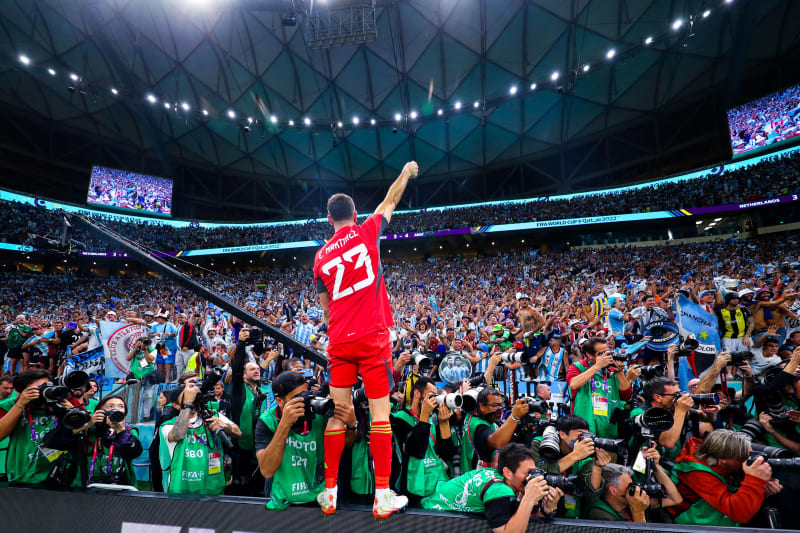The crowd felt the nerves in the Arsenal backline on Sunday. All’s well that ends well, but it was an example of how a goalkeeper can influence the mood of the fans.
In his black jersey and imposing stance, Lev Yashin exuded confidence as a goalkeeper. He was the only custodian to win European Player of the Year and the Ballon d’Or. According to Thibaut Courtois, no one gives goalkeepers the attention they deserve these days.
Yashin’s one piece of advice to unwind this mortal coil of keeping was ‘to smoke a cigarette to calm your nerves and then take a big swig of strong liquor to tone your muscles.’ Wojciech Szczesny might have taken him up on the former. The Russian commanded his area like a general. He kickstarted attacks. He was a precursor to the modern number one. The Black Spider had the crowd in the palm of his webbed hands.
The perception of a goalkeeper’s actions can directly affect the ambience of a whole stadium. Yashin was given a standing ovation at Wembley when he played for a World XI in 1963 and repelled everything England threw at him. The universe was safe in Lev’s half. We saw the reverse in live animation on Sunday. While Martin Odegaard and Mikel Arteta were trying to whip up the concerned Emirates in a very testing first half for Arsenal, the camera only had eyes for David Raya.
Gary Neville spotted it a mile off, apparently: 'They (City) should have scored. The goalkeeper is all over the place in these first few minutes. He's really shaky, Raya. He's just a bit jittery, Raya. He's not seeing things as clearly as Arsenal fans would like.'
Goalkeepers can see the whole picture from their unique vantage point. They can’t always control everything, though. Sometimes, that includes the passage of the ball. Mistakes do happen. The home bass sound tends to go mute when the coloured jersey doesn’t execute the perfectly planned moves of the training ground. Goalkeepers cannot shrivel up or doubt the moment.
They need certainty even when a decision leads to an unfortunate event . Commit to it, and if it doesn’t work, suck it up. Let the commentators talk the talk. Let the fans mumble about rotation. There’s a bigger picture at play.
Raya, described as a “number 10” by Jurgen Klopp, cannoned one off the legs of an advancing Julian Alvarez, and the ball just ricocheted wide. If that goes in, then the mood hoover would have cleaned him up. Thankfully, no harm was done.
‘Connection brings unity and a different kind of vibration between fans and players,’ said Arteta of Aaron Ramsdale’s ability to lift spirits in the stands. This transmission of trust isn’t quite there with his upgrade as of yet, beyond the mishaps that are part of the job spec.
At one point, the 28-year-old was on the ball for what seemed like an eternity, trying to pick an option that was either to split centre-backs or long. The indecision added to the narrative that rhythms were not set in motion.
Nothing functioned for the Gunners in the first 45. In the second period, the Spaniard was far more assured, collecting high balls and celebrating Gabriel Martinelli’s late winner with full velocity. A clean sheet is a good day’s work. The crowd cheered him as he let a long punt from City bounce and bounce before finally claiming it. He was onside again with the audience.
The weekend was not a particularly successful one for goalkeepers who were trying to connect with new club support. While the Ramsdale versus Raya debate revolves, other newbies are aching for a bit of crowd love. Bart Verbruggen felt the force of the Brighton boo boys in the game against Bournemouth before the end of September. The Dutchman repeatedly rolled the ball out into the D to invite the press. It soon went wrong—as it can—and Dominic Solanke gratefully received the gift. The show must go on.
This is more than just a tactical nuance. It is more difficult for goalkeepers to work their way into a match after a jittery opening because they cannot always influence the amount of ball they see. Peter Schmeichel surely had André Onana on the mind when he said:
'So you make a mistake in a game; it might be a mistake we see, it might be a mistake that we don’t see, but you wait to think about it and analyse it until after the game, at night, or whatever.
‘You have to be there for the next moment; if you’re not, you’ll make the next mistake.’ Raya cleared his mind, as did Arsenal, and they only saw the finish line, not what went before.
Onana felt a special bond with the Inter crowd through deeds rather than words. As Fabrizio Romano commented, ‘at Inter, he was fantastic because he was one of the stars of the team; the fans and the teammates used to love him in an incredible way. He needs that kind of feeling.’
Trust is something that is earned through a model of efficiency and human connection. Onana does not want to be what Vladimir Nabokov called the lone eagle.
‘The spectator tends not to remember that as a goalkeeper, I make difficult saves at great risk and start moves with my efforts,’ lamented Manuel Neuer. The risk-reward way of playing is for another discussion and another story.
Next time an outfielder throws their hands up to try and wake the crowd from their nervous slumber have a thought for the man or woman who conducts the orchestra from the back. It’s not an easy gig.








